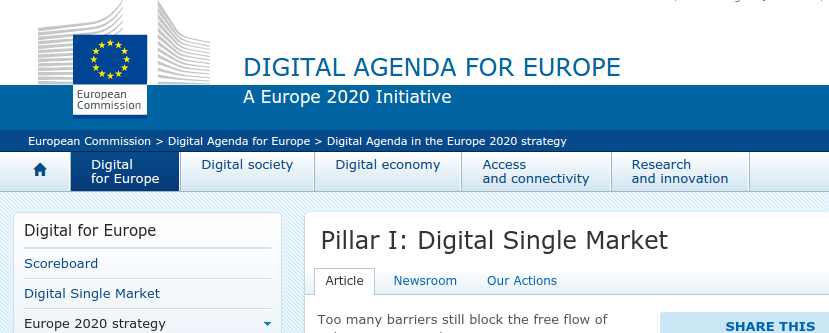EU Digital Single Market Strategy
The ITSPA secretariat have published a summary of issues that concern the Internet Telephony Service Providers’ industry in last week’s Digital Single Market Strategy. I’m sure much will be written on this subject in the coming months. In the meantime the ITSPA summary is a good little crib sheet of the issues:
Last week the EU Commission published its Digital Single Market Strategy. In the document the Commission sets out 16 key actions which it intends to complete by the end of 2016 based upon the three following pillars:
Better access for consumers and businesses to digital goods and services across Europe
Creating the right conditions and a level playing field for digital networks and innovative services to flourish
Maximising the growth potential of the digital economy
The DSM Strategy also included the following specific actions of particular relevance to ITSPA members and the telecoms industry:
Present legislative proposals to reform the current telecoms in 2016
the Strategy includes a pledge to overhaul the EU’s telecoms rules, including more effective spectrum coordination, and common EU-wide criteria for spectrum assignment at national level.
creating incentives for investment in high-speed broadband
ensuring a level playing field for all market players, traditional and new; and
creating an effective institutional framework.
Perform a comprehensively analysis of the role of online platforms (such as search engines, social media, app stores, etc.) in the market.
Reinforce trust and security in digital services, notably concerning the handling of personal data. Building on the new EU data protection rules, due to be adopted by the end of 2015, the Commission will review the e-Privacy Directive to ensure that it is aligned with the reformed data protection legislation.
We in the UK have big challenges over the next few years in respect of internet and tech related legislation. Not least since the General Election wiped some tech talent off the parliamentary map. I’m thinking in particular of former Cambridge Lib Dem MP Julian Huppert who was heavily involved in fending off the Snooper’s Charter.
It’s a bit of a worry when I see some of the text in the Digital Single Market Strategy. The worry comes in two guises. Firstly yes some of these areas need looking at. The role of search engines etc. We don’t want them forcing unfair practices.
Secondly I’m not sure I like the idea of government interfering. This is somewhat counter to my first point. If nothing else, governments rarely have the expertise required to get involved.
We aren’t going to solve it all here and now but certainly look out for more content in this space in the coming weeks and months.

